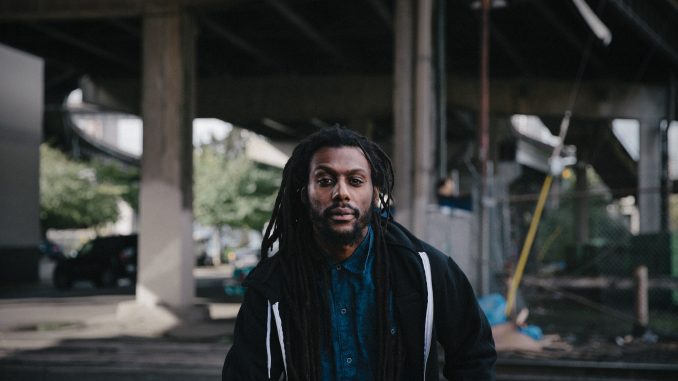
One of the many heated issues in the political arena today is education. President Donald Trump made waves when he announced that Betsy DeVos, a woman with seemingly little experience, would serve as his Secretary of Education amid swirling arguments of school choice, arts funding and budget cuts.
Several with experience inside the classroom, including Los Angeles rapper Propaganda, have taken it upon themselves to inform their followers about the importance of public education.
The Tunnel Rats vet went to Washington, D.C. last month with fellow rapper Derek Minor and the organization The Expectations Project to speak with public officials to give faces to the statistics. Propaganda was a teacher at Pomona School of Artis and Enterprise for four years before fully turning his attention to music. He has a unique platform both as a rapper who uses his music to bring awareness to social justice issues and an experienced teacher.
“It’s like sort of the two-tier punch that kind of gets me in these spaces,” he explains. “One is like yeah, once you start gathering some sort of following, whether it’s via social media or via the music career period, there’s an understanding that your music has gained you the ears of a considerable amount of people and obviously I’ve communicated my passions in my music, so the stuff somehow gets on somebody’s table. When that happens, they get to say, ‘Hey, would you like to be a part of this?’ I go, ‘Yeah!’ I actually have experience in the field. So having both of those really played a role into like sort of getting me in these rooms. But yeah, it’s because the music and even the content I choose to talk about in music just really rings true to what they wanna see and what I wanna see in the world too.”
Propaganda, who directly addressed the school system in 2015’s “Bored of Education,” released his critically-acclaimed Crooked album this summer, which helped build momentum for this trip. The staff for Senator Kamala Harris and the Long Beach district representation were all ears to what he had to share.
“They’re on our side in a sense of the protection of the Title I, II and IV programs,” he says. “So they were like look, yes, we totally agree with you. Give us some stories of actual people because we have data and stats for days, but what we need is the human aspect. So as many of y’all that can come as loud as you can hit your drum, as many actual stories you can bring us, the better.”
According to US News and World Report, there is still a vast difference in education for people of color versus white Americans. Test scores in reading from 4th, 8th and 12th grades were all lower comparing black students to white. School retention and at home literacy were also great disparities, not to mention the effect of the school-to-prison pipeline.
Propaganda further explains how specifically Title II creates a deeper sense of understanding between teachers and their students. He warns that if the program is cut, there will be a great impact on the ability for teachers to properly interact with their students, but will also create larger problems for society as a whole.
“I actually know students that were in those programs, but now they’re adults, but knowing — ‘cause I was there — if they wouldn’t have gotten the help that they had, those kids would have been lost,” he says.
On paper, Title II would seem like an easy way for lawmakers to “trim the fat” on the education budget, according to the artist, because teachers should have enough credentials through college and other required training to get by. But he says that isn’t the case.
“It teaches teachers to sort of develop social-emotional competency,” Propaganda explains. “So if you understand, again, if we’re in underserved communities, you’re dealing with kids that are probably dealing with trauma. And if they’re dealing with trauma, you as the classroom instructor, if you don’t know what you’re looking at, you’re probably going to try to do behavioral modification that has to do with just discipline.”
Discipline is not enough to solve the problem, Propaganda says. Making the students feel punished is only going to push them away from the classroom, which creates a dangerous cycle.
“Students are gonna just start ditching school,” he continues. “We have what we call chronic absenteeism. If students are ditching school, then they’re in the streets. If they’re just in the streets, then that’s raising the crime. If you’re raising the crime…”
This is what creates the need for Title II and is why Propaganda felt it was so necessary to share his experiences at the Capitol. He wanted to show the need to treat students as people with emotional needs instead of statistics who sit in detention. The earlier report pointed out that 20 percent of black male students receive out-of-school suspensions as compared to 7 percent of white males.
“I know because I went through a socio-emotional training,” he says. “I knew how to say, a lot of these kids don’t have behavioral — they have these behavioral issues, this discipline record — but it’s really because they’re suffering from PTSD. So if you know that’s the case, if you’re trained to know what you’re looking for and know what you’re looking at, you can avoid so much of those problems. And I knew students by name that they were suffering from trauma. You don’t send them to freakin detention for that. Nah, you wrap your arms around ‘em. You figure out ways to help them cope.”
https://www.instagram.com/p/BaXFJ02Aojr/?taken-by=prophiphop
Propaganda shared his experiences with his followers on social media, explaining the excitement in the middle of the business of Washington, D.C. Being there in person is much different than watching the news on television where the political arena can seem like Xanadu — the center of the Mongol Empire — or the Death Star — the epicenter of evil in the galaxy far, far away in Star Wars. He expresses a greater understanding of how things work and was able to have a sense of relatability to the people.
“You forget that these people have home states and hometowns and you can legit just get an appointment with them,” he says. “It’s just an email. And walking through the halls, you get a sense of dang, this is actually like kind of a big deal. All that happens there, the hustle and bustle, you just remember, yo, these fools are running a country. It’s kind of a trip. It’s just like man, I can’t just sit here on my couch and act like I know what I’m talking about. You don’t know how many meetings, how nuanced, how complicated, how many things go into making law.”
There are also sentiments of frustration at the complexity of the system and how the digital age has made it harder to have real conversations with people.
“A lot of these dudes have been in politics for a while. Some of them haven’t, but even still, it’s such a different time to be in politics right now because just the reality is the loudest one is right or the extremes are all that are heard,” Propaganda elaborates. “And they’re heard in five-second soundbites or headlines or tweets. But the business of what they actually have to do is so nuanced and so complicated, the only way to understand this is in longform and unfortunately longform isn’t tweetable. And they’re just kinda frustrated cause they’re like man, we can’t have legit civil discourse and find a middle because the extremes win.”
Through all of the noise, Propaganda hopes that lawmakers and officials can come and sit together and find the middle ground when discussing education reform.
“Me as an activist, burn it all down sort of hip-hop artist, I would love to see a rescue of how civil discourse is supposed to go,” he shares. “I would love to see people of sound mind and even tempers lay out actual facts with stories that reflect the nuances. ‘Cause at the end of the day, the system is designed to where you fight vigorously for your position and it’s the tug-of-war between those two fights that are well-informed. But you’re supposed to get to the middle. You’re supposed to bring all the nuanced reflections to the middle of the table and we’re all to consider them all. And then you land on what is, depending on how you understand justice, what does the most good or protects the most freedoms, depending on how you understand justice works. Whatever the case may be, I would love to see a rescue of that.”
He knows this type of discourse can seem like a pipe dream, but he finds encouragement in how the country got through the Civil Rights era, with both sides hashing it out. And ultimately, the tides changed in favor of humanity over tradition or what fit the budget.
Propaganda urges today’s lawmakers to understand that the country’s track record isn’t exactly on the side of the most vulnerable. He hopes that protecting those who need it most, which is a sign of a stable society, will be what guides future education conversations.
“I understand there’s only so many dollars to spend and to save, but understand your history of like not serving the most vulnerable well and what that says about the health of a society,” he says. “You judge the health of a society by its financials or by how well it treats its people. And it’s people that probably cannot give you the return on your investment that you desire. Maybe that’s how you show if a culture’s healthy. I would love for them to understand that all of the things you’re trying to deal with, national security, lowering taxes, all that stuff, a culture can’t flourish if it’s people aren’t properly educated. There’s a gross sense of inequity to access to that, then you’re not keeping us safe.”


Leave a Reply